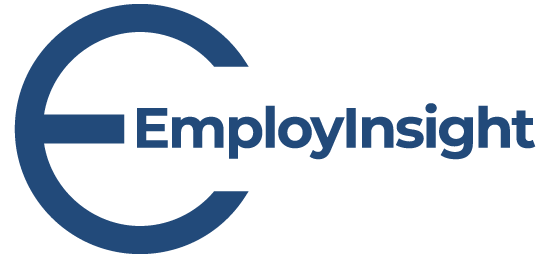Psychometric Tests
Psychometric testing and assessment serve as potent tools for employee and pre-employment screening. They enhance the understanding of employees and co-workers, enabling optimal functioning and empowering institutions to build more resilient and ethical workforces.
Comprehensive Analysis
EmployInsight integrates Verifications, Reference Checks and Psychometric assessments. This integration offers our clients and the candidate the best possible comprehensive option, enabling a fair, scientific, and holistic approach.
Our psychometric testing and assessments are tailored to the specific requirements of positions and ensure an unbiased and objective selection process.
- Our methodology enables cross-functionality on various levels.
- We use it for apprenticeships, learnerships, graduates, entry-level positions, operational specialists, and managerial levels.
- Assessment reports align perfectly with role-specific functions and competencies.
- Reports address the needs linked to the assessment for selection, learnerships or potential for succession.
The psychometrist provides clients with an executive summary where they put the information into perspective. The Psychometric Tests EmployInsight uses are administered online in a user-friendly format, which enables a national/international reach. We adhere to Psychometric testing best practices and apply tests that have proven valid, reliable, unbiased and compliant with South African labour legislation.

Key Benefits of
Psychometric Tests
- Build Resilience: Psychometric testing helps employees adapt to changing circumstances, fostering resilience—the critical trait for business survival in our dynamic environment.
- Reduce Stress, Enhance Productivity: By understanding stress levels within your team, you can implement strategies to reduce stressors and boost overall productivity.
- Counteract Losses, Ensure Gains: Psychometric assessments predict productive or counterproductive behavior, especially during challenging times, safeguarding your business.
- Boost Your Bottom Line: Placing employees in roles that align with their strengths leads to higher engagement and retention, positively impacting your business performance.
EmployInsight offers a basket of psychometric testing and assessment tools in the following categories:
- Cognitive, Ability and Skills Tests
- Personality Tests
- Motivations
- Learning Agility
- Competency Tests
- Integrity/ Ethics Tests
- Counterproductive Work Behaviour
- Emotional Intelligence Tests
- Resilience and Agility Tests
- Sales and Call Centre Tests
- Safety Assessment
- Behavioural simulation exercises

Counteracting Human Risk begins with Identifying and Eliminating Counterproductive Work Behaviour.
EmployInsight compiles comprehensive human risk profiles, assisting businesses in eliminating counterproductive behaviour and instilling a culture of productive work behaviour.
EmployInsight helps business owners prevent counter-productive behaviour in their company or business by assisting them in appointing only the best people.

FAQ
Psychometric Tests
What are Psychometric Tests?
Psychometric tests are psychological tools used by employers to gauge your suitability for a role.
These tests range in subject matter and content to measure a variety of desirable skill sets like numerical, verbal, and logical reasoning. The two main reasons companies use psychometric testing are, one to improve and reduce HR and recruitment costs and two to ensure that only quality candidates are on board, thus avoiding employee turnover.
The main goal of an aptitude or psychometric testing is to ensure that a candidate possesses the amount of skill and cognitive ability to perform the duties of a job/role. The most common skill sets being measured by these tests include numerical, verbal, and non-verbal reasoning skills. Remember, if you wish to stand out among the crowd, practising for your psychometric tests is crucial.
The assessments EmployInsight uses, are mostly administered online in a user-friendly format, which enables a national/international reach.
What is Tenant Screening?
EmployInsight offers a comprehensive tenant screening solution encompassing credit records, financial status, verification of employment, reference checks and criminal history, to determine whether the tenant may have been involved in corruption, fraud, or any other criminal offences.
focusesAlso includes an Integrity test or Questionnaire that focus on Organisational Citizen Behaviour and ethics in the workplace.
What is the Safety Profile Report?
The report also discusses the consequences of imbalances within an individual’s hardiness profile, and how to facilitate hardiness in others, which is becoming an increasingly important skill required of leaders today.
What is a Behavioural Competency Test?
In the world of work, competencies are measurable constructs of a person’s attributes and refer to the skills, knowledge, abilities, and behaviours essential for successful performance in a particular job, role, task, or function. For instance, a managerial competency would include, inter alia, the traits of systems thinking and emotional intelligence as well as skills in influence and negotiation.
Competencies are acquired through experience or training and are measured objectively against a specific job standard.
Categories of Competencies:
- Personal Effectiveness (interpersonal skills, willingness to learn, dependability, drive)
- Academic Competencies (critical and analytic thinking, technology, communication)
- Workplace Competencies (teamwork, customer focus, adaptability, business fundamentals, planning and organizing)
- Management Competencies (networking, strategic planning, developing and mentoring, evaluating budgets, managing conflict)
What is an Integrity Test?
Different levels of integrity tests can be applied to assess the various complexities and maturity levels of prospective employees in the context of your organization’s culture. EmployInsight mainly uses two different integrity tests, namely the IP200 and the IMI.
Both tests are registered with the Health Professions Council of South Africa (HPSCA).
- In practice the IP200 represents a detailed instrument that covers the complex subject field of integrity comprehensively, thereby allowing for a wide-based diagnostic analysis and interpretation in the hands of the well-informed professional user. The IP200 covers a broader field of integrity, with the intention of developing the individual and/or the corporate entity to which they belong.
- The IMI is derived from the IP200 and targets entry-level employees/candidates. It measures the same factors, but it has fewer questions that are less complicated, and it is written on a Grade 10 English standard level.
What is a Personality Test?
The 15FQ+ is an assessment of personality and individual differences. Based on an extensively researched model, the 15FQ+ personality questionnaire provides an in-depth assessment of the full sphere of human personality.
It measures the fundamental building blocks of personality. These provide insight into how people typically think, feel, and interact in ways that may be productive or counter-productive for your organization.
This personality questionnaire is an online application and is suitable for the national and international business environment. The questionnaire can be used for selection as well as for development purposes.
The 15FQ+ can assist an organization’s selection process by identifying applicants who display the personal characteristics that fit best the requirements of the role. It allows you to compare a specific job with a candidate, giving you concrete data on similarities and variances between job and candidate.
What is the Thomas Kilman Conflict Mode Instrument?
The Thomas-Kilmann Conflict Mode Instrument (TKI®) helps organisations to understand how different conflict-handling styles affect interpersonal and group dynamics, and for empowering them to choose the appropriate style for any situation.
The TKI assesses an individual’s typical behaviour in conflict situations, offering a practical way to initiate safe and constructive dialogue to resolve interpersonal conflict and improve group dynamics to support team building, leadership coaching, retention, and reducing stress.
What is the Hardiness Resilience Gauge?
In today’s world, organisations are interested in finding ways to develop their employees’ ability to deal effectively with stressful and changing circumstances. Hardiness has been understood as a generalised style of functioning that encompasses cognitive (thinking), emotional (feeling), and behavioural (acting) qualities.
Research has indicated that individuals who have higher levels of hardiness are more resilient, flexible, confident, and approach life passionately, and are therefore less likely to experience detrimental effects of stress. The report also discusses the consequences of imbalances within an individual’s hardiness profile, and how to facilitate hardiness in others, which is becoming an increasingly important skill required of leaders today.
What does the Rehabilitation Assessment Profile (RAP) measure?
The RAP presents itself in three versions, namely the ‘Prior’, ‘Post’ and ‘General’ RAP.
In essence, all these tests are assessing the same thing – i.e. the probability for a person, who went astray, will be rehabilitated.
The ‘Post’ version was specially developed for people who received a jail sentence and are qualifying for parole status.
The ‘Prior’ version assesses people that were already found guilty in a court of law, but was not yet sentenced – i.e. assessing prior to sentencing.
The ‘General’ version applies to ‘lesser’ serious cases, e.g. people who were found guilty during a Disciplinary Hearing in a corporate environment. The question in such a case is whether to continue the employment of such a person or to appoint such a person from outside. What is the risk the employer is taking; which is again directly related to the probability that such a person will be successfully reformed?
This is the answer provided by this test.
What does the Error Checking Test measure?
This measures a participant’s checking accuracy. Participants are presented with detail-orientation pairs of words, numbers and a combination of both words and numbers. Participants are asked to determine whether the pairs are identical or not.
An accurate detail-checking ability is important for jobs that require individuals to have a high level of detail orientation.
What is the Workplace Orientation Test (WOT)?
The WOT assesses and predicts the probability of the candidate performing his/her job as well/effectively, or even better from another workplace, (e.g., home) than the traditional office or work environment situation.
This assists the user to identify which of their candidates should most probably be effective in performing his/her task from home on an effective basis.
What is the Numerical Reasoning Test?
This test measures:
- Number Problems: The ability to add, subtract, multiply and divide across a range of numerical problems.
- Patterns: The ability to solve problems that require the identification of patterns in numerical content.
- Interpretation: The ability to read and interpret basic numerical information contained in a graph.
What is the Domestic Services Profile (DSP)?
The DSP is a composite test to assess and predict the effective and successful rendering of services in the domestic domain which is typically associated with providing the needs of house-keeping, cleaning, maintenance, child and people care and in the process demonstrating the necessary cognitive, emotive and human/people-orientation and technical ability and skills that are based on the required mental, attitudinal, personality, integrity and work ethic dispositions as well as a basic interest, competency, experience and language/communication ability.
The instrument assesses and predicts the properties related to the successful functioning of the job types associated with the domestic services sector – ranging from house-keeping, cleaning, maintenance, child- and people-care and to manage such in the said sector of the economy as well as in the social sphere.
15FQ+ Advanced Report
The 15FQ+ Advanced measures behavioural competencies such as logical and analytical approach, resilience, persuasiveness, creativity, planning and organising, quality orientation, and interpersonal approach.
It includes emotional intelligence which looks at aspects such as emotional self-awareness, self-control, achievement orientation, adaptation and trustworthiness, for instance.
This report also includes derailers. This refers to dysfunctional behaviours that can present challenges for organisations in a variety of work settings.
15FQ+ Complete report which is the most comprehensive report
The 15FQ+ complete report measures leadership style, team style, influencing style, and thinking style. It also includes behavioural competencies, emotional intelligence and derailers.
16 Personality Factor (16Pf)
The 16pf measures 16 different primary personality characteristics structured around the “Big Five” global factors of personality, thereby providing a fully rounded picture of the individual. By matching key characteristics of a job with individual traits using the 16pf, better job fit can be obtained and, as a result, turnover can be lowered, and consistent performance can be ensured.
Behavioural Competency Test
In the world of work, competencies are measurable constructs of a person’s attributes and refer to the skills, knowledge, abilities, and behaviours essential for successful performance in a particular job, role, task, or function. For instance, a managerial competency would include, inter alia, the traits of systems thinking and emotional intelligence as well as skills in influence and negotiation.
Competencies are acquired through experience or training and are measured objectively against a specific job standard.
Categories of Competencies:
- Personal Effectiveness (interpersonal skills, willingness to learn, dependability, drive)
- Academic Competencies (critical and analytic thinking, technology, communication)
- Workplace Competencies (teamwork, customer focus, adaptability, business fundamentals, planning and organizing)
- Management Competencies (networking, strategic planning, developing and mentoring, evaluating budgets, managing conflict)
Basic Traits Inventory (BTI)
The Basic Traits Inventory (BTI) is a South African-developed personality inventory that assesses the Big Five factors of personality.
Each of the factors is further divided into four or five facets, resulting in 24 pieces of information that outline the unique ways in which individuals think and feel, engage in relationships with others, or approach work.
Career Values Scale (CVS)
The Career Values Scale (CVS) assists individuals in gaining insightful information about their work values, preferences and needs, in order to achieve their personal goals and overall job satisfaction.
This report involves a description of ten career values: Service Orientation, Teamwork, Influence, Creativity, Independence, Excitement, Personal Development, Financial Rewards, Prestige and Security.
It contains descriptions of what is important to the individual, what the main sources of satisfaction and dissatisfaction are, and suggestions for working with this knowledge.
CAT Call Centre Agent Test
The instrument assesses and predicts the properties related to the successful functionary in the various types of operational positions associated with the Call Centre concept.
Ranging from the more simplistic functional position of the Call Centre Agent who deals with high volume and repetitive collecting and providing of basic information, to Call Centre Agents who are dealing with more complex enquiries, time-consuming problem-solving, specialized know-how and the ability to resolve issues of an advantaged nature in a short period of time, being accountable for the matter by accepting full ownership and responsibility for satisfying his/her client in the process.
Cognitive Potential Assessment (COPAS)
The COPAS is a comprehensive measure of cognition as applied in the world of work. It can be used for the Selection process and Career Planning and Development.
The COPAS provide a Profile of the six most important Cognitive Constructs, e.g. Analytical, Original and Figurative Thinking in problem-solving in practice.
Cognitive Processing Profile (CPP)
The CPP externalises and tracks thinking processes to indicate a person’s cognitive preferences and capabilities. Based on this information, a suitable work environment, learning potential and developmental needs of the person can be identified.
The CPP assessment involves an unfamiliar task which requires the person to decipher messages written in symbols. While completing the assessment, a person explores, links, structures, transforms, remembers, learns, clarifies information and monitors his/her own problem-solving actions.
Highly recommended for your highest level positions, and can be used for developmental purposes.
Define an Integrity Test
An integrity test is a reference check on the employee’s credentials.
People who score high on integrity tests tend to be more trustworthy, dependable, honest and responsible employees. They are more likely to engage in behaviour that can benefit the company.
Selecting employees with higher integrity, therefore, has the potential of a more stable workforce through reducing labour turnover, less management time spent on disciplinary matters and counterproductive work behaviour issues.
Define Counterproductive work behaviour
Counterproductive work behaviour is a pervasive and expensive dilemma for organisations in South Africa. It has many different manifestations, for example, theft of company money, products and equipment, lying, taking excessive breaks, leaving early, intentionally working slowly, mediocre quality of work, inflated claims for travelling/lodging, destruction of property, alcohol and drug abuse.
The more positive the candidate’s integrity is, the less the likelihood of counterproductive behaviour.
Ethics
In a nutshell, Ethics in the workplace is about employees and organisational leaders making decisions and behaving in ways that are good for the sustainability of the business or organisation itself, as well as for the community in which it operates and the environment.
Ethics Risk Assessment includes:
- Getting to know your staff, their views and beliefs regarding workplace ethics and attitudes towards leadership.
- Finding out what your risk factors are for fraud and corruption: Are the targets structured realistically? Is management expecting untoward business dealings from their staff? Is staff morale low?
- Finding out whether your employees are aware of fraud or corruption in your organisation, and whether they know what to do if they became aware of it.
EmployInsight will also offer suggestions to mitigate the identified risks.
GIOTTO
The Giotto is an integrity test designed specifically for use in work situations. This questionnaire help to provide a more accurate and reliable measure of a candidate’s strengths and weaknesses across different dimensions.
High scores on these dimensions may provide protection against:
- Carelessness, accident proneness, mindlessness
- Lack of commitment, absenteeism, tardiness
- Proneness to violence, hostility, intimidation
- Disciplinary problems, subversion, intolerance
- Disrespect for senior managers, overbearing behaviour, arrogance
- Theft of company property, wasteful use of resources, failure to share
- Inability to cope with change, lack of self-confidence, anxiety
Hogan Business Reasoning Inventory (HBRI)
The Hogan Business Reasoning Inventory (HBRI) examines your reasoning styles on the job, and assesses your reasoning skills, enabling employers to understand your unique problem-solving styles, capabilities, and weaknesses.
This inventory is used specifically in the business community as the HBRI identifies reasoning abilities and problem-solving styles that predict success in business.
Integrity
Different levels of integrity tests can be applied to assess the various complexities and maturity levels of prospective employees in the context of your organization’s culture.
EmployInsight mainly uses two different integrity tests, namely the IP200 and the IMI.
Both tests are registered with the Health Professions Council of South Africa (HPSCA).
- In practice the IP200 represents a detailed instrument that covers the complex subject field of integrity comprehensively, thereby allowing for a wide-based diagnostic analysis and interpretation in the hands of the well-informed professional user. The IP200 covers a broader field of integrity, with the intention of developing the individual and/or the corporate entity to which they belong.
- The IMI is derived from the IP200 and targets entry-level employees/candidates. It measures the same factors, but it has fewer questions that are less complicated, and it is written on a Grade 10 English standard level.
Integrity Measuring Instrument (IMI)
Measuring Areas – Ten Substructures of Integrity:
- Honesty: A candidate’s perception of himself as well as how he believes he is being perceived by others.
- Stealing/Theft: Respect for the property of others and non-violation of this approach.
- Violation of policy, rules & regulations: Adherence to stipulated rules and regulations, and the respect thereof.
- Reliability and Dependability: The degree to which the candidate can be relied on, which also implies a high probability of loyalty to work and colleagues.
- Lying: The specific orientation towards the concept of lying with its associated manifestations of deceit, falsification, perjury and the deliberate misleading of, and misrepresentation to others
- Denial, Projection & Justification: This area assesses the candidate’s open and honest perception of his own shortcomings and accepting accountability for his own mistakes, or (by implication) his typical tendency to deny the existence thereof.
- Work Ethic: This area assesses the values associated with the moral virtues of hard work and diligence.
- Manipulation: This area assesses the degree to which a candidate will tend to abuse any power at their disposal, using it to manipulate others in their self-serving quest.
- Verifiable Items: This area assesses in a more objective, tangible and verifiable way, deviations in the candidate’s behaviour from the generally accepted day-to-day norms. In this case, attitude and general orientation to each factor are not being assessed, but rather a ‘recorded’ history of misbehaviour in each of the above.
- Lie Detector: This is the degree to which the candidate was objective, open-minded and accurate in completing the IMI by providing valid responses on the items and presenting a true and honest picture of himself.
Integrity Profile 200 (IP200)
The Ip200 evaluates 10 substructures, namely: Socialisation, Trustworthiness, Work Ethics, Attitude– Integrity Constraining, Behaviour: His historical, present and future behavioural and projected typical behavioural inclination – good and bad.
This is not a ‘once-off’ behaviour, and this influences his present and future perception and behaviour, Manipulative Abuse of Power, Values, Transformation Commitment & Management Integrity: His perception of how well his present or previous ‘employer’ live up to providing an acceptable corporate and managerial environment, Monitor: This is a composite score reflecting on the degree of objectivity, open-mindedness, accuracy and trustfulness with which he completed the instrument.
Mental Agility Series: General Potential Standard Assessment
A person’s general mental ability provides the basis for determining their ‘mental agility’, or their capacity to learn new skills, adapt to new situations and develop a body of expert knowledge, whilst also acting as a determinant of speed and accuracy on routine tasks assigned to be used to.
This report helps match people to jobs in terms of their learning and problem
solving ability and decision-making confidence.
Meyer Briggs MBTI
The Myers–Briggs Type Indicator (MBTI) is an internationally trusted assessment of personality type that assists people to gain insight about themselves and how they interact with others. It is an introspective self-report questionnaire indicating differing psychological preferences in how people perceive the world and make decisions.
The test attempts to assign four categories: introversion or extraversion, sensing or intuition, thinking or feeling, and judging or perceiving. This can be applied to all areas of human interaction and personal development.
The MBTI profile reveals how we see and interact with the world, giving insight into our motivation and the motivation of others. This provides a strong foundation for personal growth and development, underpinning enhanced personal effectiveness.
OPPro
The Occupational Personality Profile measures nine personality dimensions and has 98 items. The language in the South African version was specially simplified based on South African research.
It measures aspects such as thinking style, coping style, interpersonal style,
Personality at Work (PAW)
The PAW (Personality at Work) assesses personality traits that apply specifically to the world of work.
This questionnaire describes personality in general, namely:
- Doing and Work Orientation
- Self and Perception Orientation
- Thinking and Styles Orientation
- People and Relations Orientation
- Emotions and Feelings Orientation
Personality Test
The 15FQ+ is an assessment of personality and individual differences.
Based on an extensively researched model, the 15FQ+ personality questionnaire provides an in-depth assessment of the full sphere of human personality. It measures the fundamental building blocks of personality. These provide insight into how people typically think, feel, and interact in ways that may be productive or counter-productive for your organization.
This personality questionnaire is an online application and is suitable for the national and international business environment. The questionnaire can be used for selection as well as for development purposes.
The 15FQ+ can assist an organization’s selection process by identifying applicants who display the personal characteristics that fit best the requirements of the role. It allows you to compare a specific job with a candidate, giving you concrete data on similarities and variances between job and candidate.
The Emotional Quotient-Inventory 2.0® (EQ-I 2.0®)
The following composite scores are determined:
- Self-Perception: Self-Regard, Self-Actualization, Emotional Self-Awareness
- Self-Expression: Emotional Expression, Assertiveness, Independence
- Interpersonal: Interpersonal Relationships, Empathy, Social
- Responsibility Decision Making: Problem-Solving, Reality Testing, Impulse Control
- Stress Management: Flexibility, Stress Tolerance, Optimism Well-Being
- Indicator: Happiness.
Work Ethics Assessment
Identifies counterproductive behaviour within the work environment.
Work-related Risk and Integrity Scale (WRISc)
Counterproductive work behaviour (CWB) is a pervasive problem, resulting in major losses each year in countries all over the world. The Work Risk and Integrity Scale (WRISc) was developed to help mitigate the problem of CWB.
The WRISc is a personality-based, covert integrity measure developed with the specific aim of identifying a range of negative behaviours that can cause harm to employees or organisations.
Unlike overt integrity assessments, where the purpose of the assessment is obvious, personality-based assessments like the WRISc measure constructs predictive of counterproductive behaviour in a way that is less susceptible to socially desirable responding.
